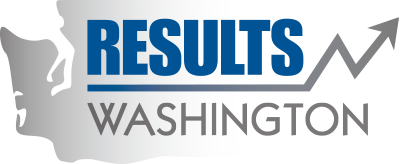Archived: Increase Small Business Employment
Data source: WA State Employment Security Department. Quarterly Census of Employment and Wages (QCEW).
The vast majority of Washington businesses (over 95 percent) have fewer than 50 employees. Small businesses often provide local services in rural communities and are owned by our neighbors. Small businesses are personal, they provide income across the income spectrum, and can encourage entrepreneurial talent and investment in our economy, including in areas with chronically high rates of unemployment. Small businesses are agile, and can respond quickly to market opportunities, provided they have access to growth capital.
Small businesses are also fragile, with a high failure rate. Small businesses face unique challenges, and, often are impacted differently by state rules and regulations than medium and large businesses, in part because they lack internal regulatory experts to inform their planning. Most businesses start small, and that's why it is so important to focus on supporting emerging businesses across industry sectors.
Small businesses in Washington State generated over $193 billion in Gross Business Income in 2012, over 30 percent of all the state's business income. In addition, small businesses, with at least one employee, account for about 40 percent of total employment, with over 1.1 million jobs. In 2014, small businesses generated $218 billion in Gross Business Income.
The target is to help small businesses create 67,000 jobs by Dec. 2015. As of 2015, QCEW data (2014 Q3 through 2015 Q2) shows we have added 70,625 jobs since 2012, surpassing the target early by 3,625 jobs, added in small businesses. The next 2 quarters will clarify growth and trend. The last data point for this 2015 target will be available in June 2016. This measure is currently on track, and above target.
Another indication of small business employment growth comes from the Paychex small business job index [1] . As of August 2014, Washington was estimated to have the second greatest annual growth in small business employment of the largest 20 states. Both for 2014 & 2015 Washington ranked 1st for small business employment of the 20 largest states, with Seattle ranking second among metros in August, and in April 2015 ranking 1st of all 20 metro areas.
See more at: http://www.paychex.com/jobs-index/index.aspx
[1]Paychex/HIS small business job index. Analysis of state and metro data is provided to reveal trends in small business employment from the country’s 20 largest states and metro areas based on U.S. population. Percentages are based on a 12-month change.
State government has three important avenues to promote small business employment growth in the state:
Inputs - facilitate support of small business training, advising, and financing. Efforts include supporting financial literacy training and entrepreneurial training for some interested unemployed workers'.
Ease - improve ease of learning and following the regulations and access to government assistance. Efforts include developing a business on-line portal with comprehensive access to state accounts, an accessible on-line guide to government rules and regulations, and ensuring that immigrant business owners have access to small business liaisons through the consistent use of translation services.
Sales- facilitate growth in revenue. Efforts include state small business procurement efforts and the Main Street program, which allows communities to access resources to promote downtown revitalization and the promotion of "buy local" programs to increase awareness of local products and services.
If you are a consumer, support your local small businesses by buying local.
For more information:
Small Business Guide: http://ora.wa.gov/site/alias__oria/345/default.aspx
Small Business Liaisons: http://www.ora.wa.gov/portals/_oria/VersionedDocuments/Business_Publications/sbl_flyer.pdf
New Business Roadmap: http://dor.wa.gov/Docs/Pubs/BusReg/Roadmap.pdf
Grow a Business: http://access.wa.gov/topics/business/growbusiness
